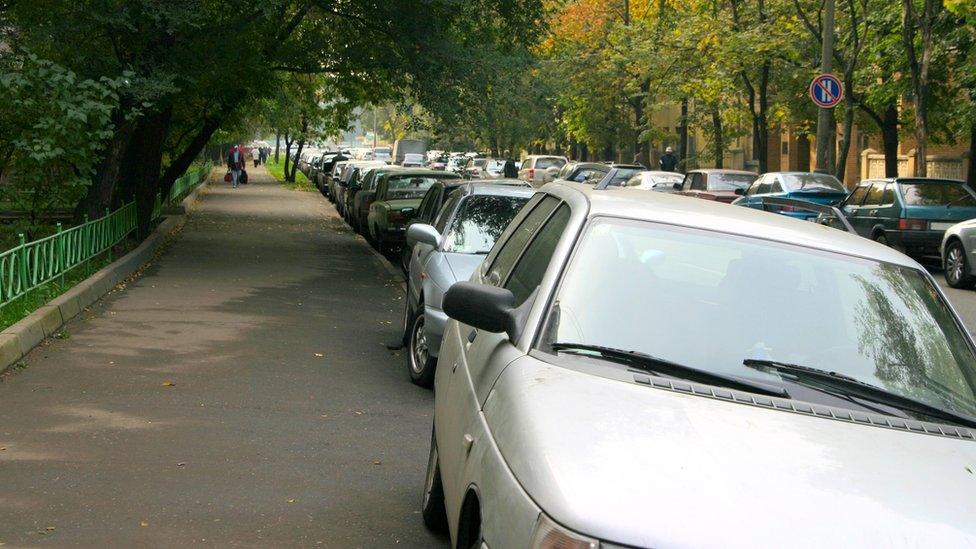Pavement parking could be banned in England
- Published
- comments

Parking on pavements could be banned in England to help pedestrians, the Department for Transport has said.
With the exception of London - where a ban already exists - only lorries are currently prevented from pavement parking.
The government is to open a consultation on whether to give local authorities more parking powers.
The AA, however, has warned a ban could have "unintended consequences" and cause more widespread "parking chaos".
The consultation comes after a committee of MPs last year called for a nationwide ban on the "blight" of parking on pavements.
Witnesses told the Commons' transport committee that the worst cases of pavement parking were effectively trapping disabled, elderly and vulnerable people, making them "afraid to leave their homes".
The cross-party group said blocked-off walkways were also exacerbating the issue of loneliness in Britain.
Transport Secretary Grant Shapps said: "Vehicles parked on the pavement can cause very real difficulties for many pedestrians."
He said the consultation would look at a variety of options, including giving local authorities extended powers to crack down on this behaviour.
Conservative MP Huw Merriman, who chairs the transport committee, welcomed the consultation, noting that the government had promised in 2015 to look into the issue but consultations and reviews had failed to improve roadside conditions.
"This government has signalled an intent to finally deliver change," he said, adding that detailed timings were needed.

London's ban

While ministers consider outlawing pavement parking across England, a ban has been in place in London since 1974.
One of its main aims is to prevent pedestrians, including wheelchair users, people with baby buggies and the visually impaired, from being obstructed.
But it is also about limiting damage to footways - unlike roads, pavements are not designed to take the weight of vehicles.
The rules apply to almost all streets in London at all times, and those who flout them can be given a parking ticket of up to £130 and be towed away - even if just one or two wheels are parked on the footway.
Exceptions to the ban include vehicles that have been exempted by councils and for unloading or loading when there is no other method available.
It is a widespread issue - a YouGov survey in 2018 found 65% of drivers admitted to having previously parked on the pavement.
Sources: Royal Society for the Prevention of Accidents, external & London Councils, external

'Unintended consequences'
The AA said it agreed that people who park in an anti-social way should be penalised.
But it added: "An outright ban could lead to unintended consequences with parking chaos becoming more widespread.
"A better solution would be for councils to make a street-by-street assessment and where pavement parking could be allowed it be clearly marked and signed."
Last year, Scotland became the first country in the UK to legislate against pavement parking. The ban comes into place in 2021.
- Published9 September 2019

- Published22 February 2020
